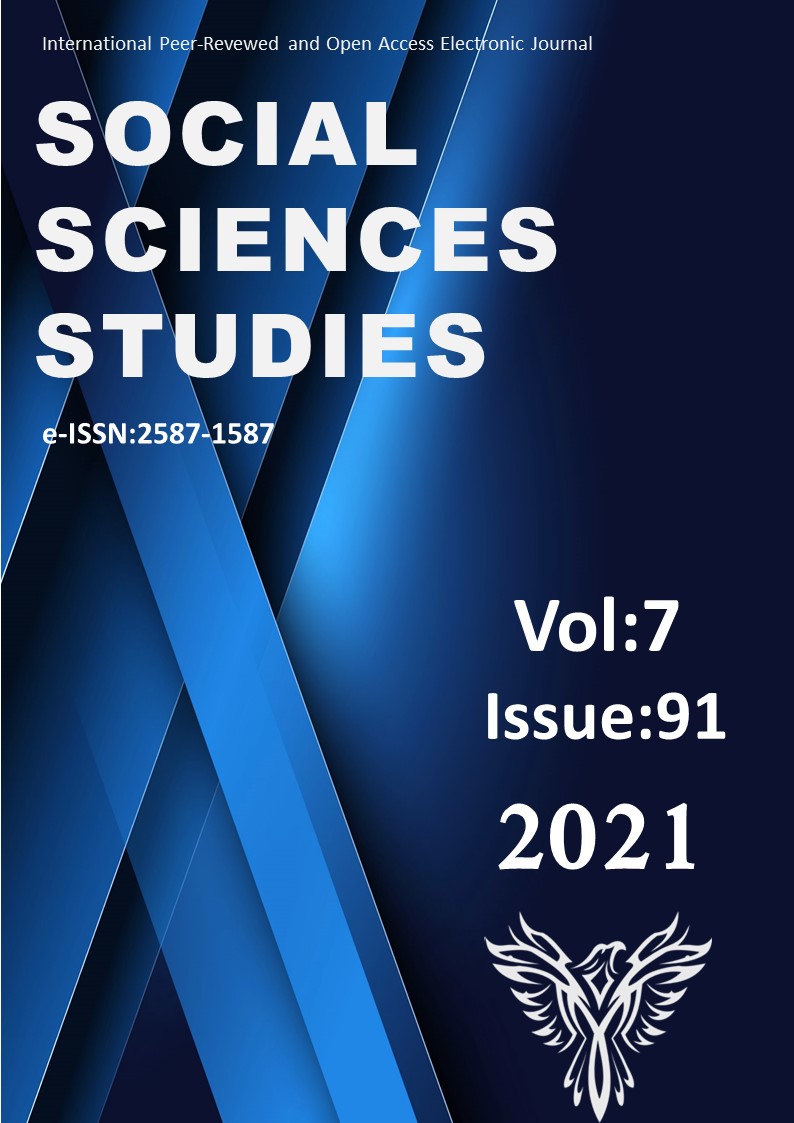COVID-19 SÜRECİ ELEKTRONİK MARKET ALIŞVERİŞLERİNDE HİJYEN KURALLARINA UYGUNLUĞUN MÜŞTERİLER AÇISINDAN GÜVENİLİRLİĞİ İNCELENMESİ
Author :
Abstract
Aralık 2019’da Çin’in Wuhan kentinde ortaya çıkan yeni tip koronavirüsün küresel bir salgına dönüştümesi neticesinde Dünya Sağlık Örgütü’nün 11 Mart 2020 tarihinde pandemi ilanıyla da dünya kamuoyunun uzun bir süre gündemini oluşturmuştur (WHO, 2020). Türkiye’de ilk vakanın görüldüğü 11 Mart 2020’de Covid-19 nedeniyle 114 ülkede yaklaşık 5 bin kişi yaşamını yitirmiştir. Yaşanan bu gelişmelerle birlikte alınan tedbirler kapsamında bireylerin yaşamlarında da bir takım alışkanlıkların değiştiğini söylemek mümkündür. Bunların arasında tüketim faaliyetlerinin virüs yayılımını yavaşlatmak amacıyla farklı pazarlama metodlarını ortaya çıkarmıştır. Bireylerin öncelikleri arasında bulaş riskinin en az düzeyde olduğu hijyenik koşullarda hazırlanan tüketim ürünlerine ulaşmak yer almıştır. Bu çerçevede sunulan pazarlama stratejileri neticesinde temassız teslimat gibi farklı uygulamalar yaygınlık kazanmıştır. Çalışmanın amacı Covid-19 süreciyle birlikte artış gösteren Elektronik market alışverişlerinin tedarik zincirinde hijyenik kurallara uyulmasının müşteriler açısından güvenirlilik düzeyi incelemektir. Bu amaçla güvenlik kavramının gıda güvenliği çerçevesinde müşteriler açısından farkındalığı analiz edilmektedir. Gıda güvence sistemleri ile yerel ölçekte hijyen kuralarının kontrolünün hangi kurumlar tarafından yürütüldüğü bilgileri test edilmektedir. Bu bağlamda müşterilerin hijyen kurallarına uygunluk düzeylerindeki güvenilirliğin test edildiği çalışmada öne sürülen hipotezlerden; Gıda güvenliği kavramının eğitim düzeyi arttıkça bilinirliğinin arttığı, Yaş grubu arttıkça ambalajlı ürün tercihinin arttığı, Eğitim düzeyi arttıkça hijyen kuralları denetimini yapan kurumları daha çok bilindiği görülmektedir.
Keywords
Abstract
As a result of the transformation of the new type of coronavirus that emerged in Wuhan, China in December 2019 into a global epidemic, the World Health Organization has set the agenda of the world public for a long time with the pandemic announcement on March 11, 2020 (WHO, 2020). The first case in Turkey on March 11, 2020 Covid-19 because it is seen in 114 countries around 5 thousand people have lost their lives. With these developments, it is possible to say that some habits have changed in the lives of individuals within the scope of the measures taken. Among them, different marketing methods have been created in order to slow down the virus spread of consumption activities. One of the priorities of individuals was to reach consumer products prepared under hygienic conditions with the lowest contamination risk. As a result of the marketing strategies offered within this framework, different applications such as contactless delivery have become widespread. The aim of the study is to examine the level of reliability for customers in the supply chain of electronic grocery shopping, which has increased with the Covid-19 process. For this purpose, the awareness of the concept of safety for customers within the framework of food safety is analyzed. With food assurance systems, the information by which institutions control the hygiene rules at local scale is tested. In this context, among the hypotheses put forward in the study in which the reliability of the customers' compliance with the hygiene rules is tested; It is seen that the awareness of the concept of food safety increases as the education level increases, the preference of packaged products increases as the age group increases, As the education level increases, the institutions that carry out hygiene rules are more known.
Keywords
- Ekiyor, A. & Hakses, M. (2021). “Covıd-19 Süreci Elektronik Market Alışverişlerinde Hijyen Kurallarına Uygunluğun Müşteriler
- Açısından Güvenilirliği İncelenmesi” International Social Sciences Studies Journal, (e-ISSN:2587-1587) Vol:7, Issue:91; pp:5154- COVID-19 SÜRECİ ELEKTRONİK MARKET ALIŞVERİŞLERİNDE HİJYEN KURALLARINA UYGUNLUĞUN MÜŞTERİLER AÇISINDAN GÜVENİLİRLİĞİ İNCELENMESİ Investigation Of The Reliability Of The Compliance With Hygiene Rules In Electronic Market Shopping In The Covid-19 Process For Customers Doç. Dr. Aykut EKİYOR Ankara Hacı Bayram Veli Üniversitesi, İktisadi ve İdari Bilimler Fakültesi, Sağlık Yönetimi Bölümü, Ankara/TÜRKİYE ORCID ID: https://orcid.org/0000-0002-7718-9329 Öğr. Gör. Meryem HAKSES Selçuk Üniversitesi, Cihanbeyli Meslek Yüksekokulu, Yönetim ve Organizasyon Bölümü, Konya/TÜRKİYE ORCID ID: https://orcid.org/0000-0002-6476-1883 ÖZET Aralık 2019’da Çin’in Wuhan kentinde ortaya çıkan yeni tip koronavirüsün küresel bir salgına dönüştümesi neticesinde Dünya Sağlık Örgütü’nün 11 Mart 2020 tarihinde pandemi ilanıyla da dünya kamuoyunun uzun bir süre gündemini oluşturmuştur (WHO, 2020). Türkiye’de ilk vakanın görüldüğü 11 Mart 2020’de Covid-19 nedeniyle 114 ülkede yaklaşık 5 bin kişi yaşamını yitirmiştir. Yaşanan bu gelişmelerle birlikte alınan tedbirler kapsamında bireylerin yaşamlarında da bir takım alışkanlıkların değiştiğini söylemek mümkündür. Bunların arasında tüketim faaliyetlerinin virüs yayılımını yavaşlatmak amacıyla farklı pazarlama metodlarını ortaya çıkarmıştır. Bireylerin öncelikleri arasında bulaş riskinin en az düzeyde olduğu hijyenik koşullarda hazırlanan tüketim ürünlerine ulaşmak yer almıştır. Bu çerçevede sunulan pazarlama stratejileri neticesinde temassız teslimat gibi farklı uygulamalar yaygınlık kazanmıştır. Çalışmanın amacı Covid-19 süreciyle birlikte artış gösteren Elektronik market alışverişlerinin tedarik zincirinde hijyenik kurallara uyulmasının müşteriler açısından güvenirlilik düzeyi incelemektir. Bu amaçla güvenlik kavramının gıda güvenliği çerçevesinde müşteriler açısından farkındalığı analiz edilmektedir. Gıda güvence sistemleri ile yerel ölçekte hijyen kuralarının kontrolünün hangi kurumlar tarafından yürütüldüğü bilgileri test edilmektedir. Bu bağlamda müşterilerin hijyen kurallarına uygunluk düzeylerindeki güvenilirliğin test edildiği çalışmada öne sürülen hipotezlerden; Gıda güvenliği kavramının eğitim düzeyi arttıkça bilinirliğinin arttığı, Yaş grubu arttıkça ambalajlı ürün tercihinin arttığı, Eğitim düzeyi arttıkça hijyen kuralları denetimini yapan kurumları daha çok bilindiği görülmektedir. Anahtar Kelimeler: Covid-19, e-ticaret, gıda güvenliği, hijyen standartları. ABSTRACT
